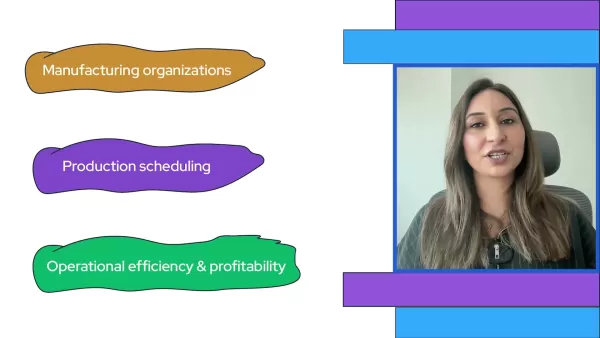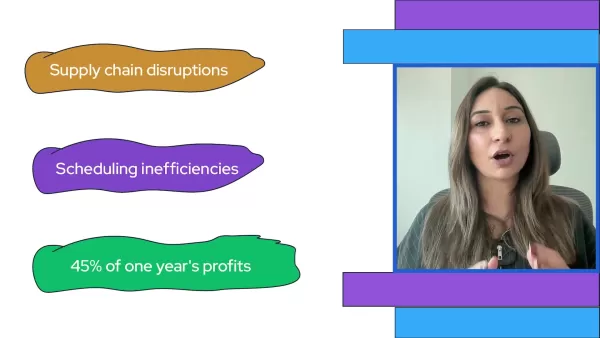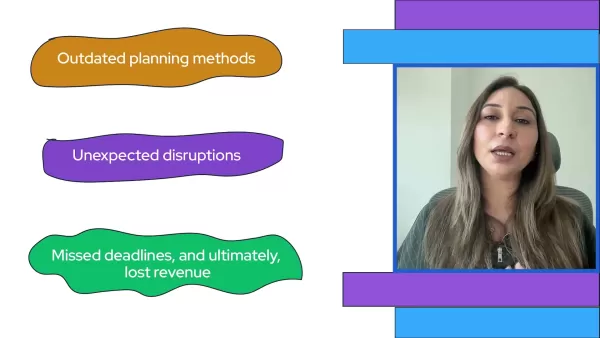Boost Efficiency with AI-Powered Agile Production Scheduling
Revolutionizing Manufacturing: How AI-Driven Production Scheduling Boosts Efficiency
In today’s hyper-competitive manufacturing landscape, efficiency isn’t just a goal—it’s a necessity. Missed deadlines, wasted resources, and supply chain disruptions can cripple profitability, with some companies losing nearly half of their annual profits due to inefficiencies. But what if you could predict disruptions, optimize workflows, and adapt in real-time?
Enter Agile AI, a game-changing approach to production scheduling that leverages multi-agent AI systems to streamline operations, eliminate bottlenecks, and maximize productivity.
Why Optimized Production Scheduling Matters
The High Stakes of Inefficient Scheduling
Manufacturing isn’t just about assembling parts—it’s about precision, timing, and resource management. A poorly optimized schedule can lead to:
- Costly downtime (idle machines = lost revenue)
- Wasted materials (overstocking or shortages)
- Missed deadlines (penalties, lost contracts, unhappy customers)
- Increased operational costs (labor, energy, logistics)
Studies show that scheduling inefficiencies alone can cost businesses up to 45% of their yearly profits. That’s a staggering figure—one that underscores the need for smarter, AI-driven solutions.

The Pitfalls of Outdated Planning Methods
Many manufacturers still rely on manual spreadsheets, gut-feeling forecasts, and rigid scheduling systems—methods that simply can’t keep up with today’s volatile supply chains.
Common challenges include:
- Unpredictable disruptions (supply delays, machine breakdowns, labor shortages)
- Inflexible scheduling (no real-time adjustments)
- Lack of visibility (poor coordination between departments)
The solution? AI-powered agility.
How Agile AI Transforms Production Scheduling
The Power of Multi-Agent AI Systems
Agile AI doesn’t just automate scheduling—it reinvents it with specialized AI agents that work together like a well-oiled machine:
- 📊 Demand Forecasting Agents – Predict future needs with machine learning, reducing guesswork.
- 📅 Planning Agents – Generate optimized schedules based on real-time constraints.
- ⚙️ Resource Allocation Agents – Dynamically assign labor, machines, and materials to prevent bottlenecks.
- 👁️ Execution & Monitoring Agents – Act as a 24/7 supervisor, adjusting schedules on the fly.
- 📈 Performance Analysis Agents – Identify inefficiencies and suggest continuous improvements.

Real-World Benefits: What You Can Expect
Companies using Agile AI report:
✔ 20% faster production times
✔ 15% higher on-time delivery rates
✔ 10% lower inventory costs
✔ 5-10% better equipment utilization
✔ 15% less downtime
These aren’t just numbers—they translate into higher profits, happier customers, and a stronger competitive edge.
Implementation: Seamless, Scalable, and Smart
Easy Integration with Existing ERP Systems
Worried about overhauling your current setup? Don’t be. Agile AI integrates smoothly with most ERP systems, including legacy platforms.
The process is simple:
- Connect to your ERP.
- Sync data for real-time insights.
- Configure to match your workflows.
- Train your team (with ongoing support).

Step-by-Step: Navigating the Agile AI Dashboard
- Log in (supports Google/Microsoft accounts).
- Monitor demand forecasts (track accuracy, adjust predictions).
- Optimize schedules (see real-time adjustments).
- Get alerts (underused machines? Overworked staff?).
- Generate reports (identify inefficiencies).

Pricing & Considerations
Flexible Plans for Every Business
Agile AI offers custom pricing—whether you’re a small manufacturer or a global enterprise.
Pros:
✅ AI-driven demand forecasting
✅ Dynamic resource allocation
✅ Seamless ERP integration
✅ Reduced downtime & waste
Cons:
⚠️ Initial setup cost
⚠️ Requires accurate data input
⚠️ Staff training needed
Who Benefits Most?
Agile AI is a game-changer for industries like:
- Automotive (fluctuating demand, complex supply chains)
- Aerospace (strict deadlines, high-value components)
- Electronics (fast-moving tech, rapid production cycles)
- Pharmaceuticals (regulatory compliance, batch tracking)
- Food & Beverage (perishable goods, tight margins)
FAQs
❓ How does Agile AI improve scheduling?
By using AI agents to forecast demand, optimize resources, and adjust in real-time.
❓ Will it work with my current ERP system?
Yes—it integrates with most ERP platforms, even older ones.
❓ What results can I expect?
Faster production, fewer delays, lower costs, and higher profits.
❓ Is training provided?
Absolutely—Agile AI offers full onboarding and support.
Final Thoughts: The Future of Manufacturing is AI-Driven
Gone are the days of static schedules and reactive fixes. With Agile AI, manufacturers gain predictive insights, real-time adaptability, and a clear path to efficiency.
The question isn’t if you should adopt AI-driven scheduling—it’s how soon you can start.
🚀 Ready to transform your production line? Get a custom quote today.
Related article
 Best AI Tools for Creating Educational Infographics – Design Tips & Techniques
In today's digitally-driven educational landscape, infographics have emerged as a transformative communication medium that converts complex information into visually appealing, easily understandable formats. AI technology is revolutionizing how educa
Best AI Tools for Creating Educational Infographics – Design Tips & Techniques
In today's digitally-driven educational landscape, infographics have emerged as a transformative communication medium that converts complex information into visually appealing, easily understandable formats. AI technology is revolutionizing how educa
 Topaz DeNoise AI: Best Noise Reduction Tool in 2025 – Full Guide
In the competitive world of digital photography, image clarity remains paramount. Photographers at all skill levels contend with digital noise that compromises otherwise excellent shots. Topaz DeNoise AI emerges as a cutting-edge solution, harnessing
Topaz DeNoise AI: Best Noise Reduction Tool in 2025 – Full Guide
In the competitive world of digital photography, image clarity remains paramount. Photographers at all skill levels contend with digital noise that compromises otherwise excellent shots. Topaz DeNoise AI emerges as a cutting-edge solution, harnessing
 Master Emerald Kaizo Nuzlocke: Ultimate Survival & Strategy Guide
Emerald Kaizo stands as one of the most formidable Pokémon ROM hacks ever conceived. While attempting a Nuzlocke run exponentially increases the challenge, victory remains achievable through meticulous planning and strategic execution. This definitiv
Comments (2)
0/200
Master Emerald Kaizo Nuzlocke: Ultimate Survival & Strategy Guide
Emerald Kaizo stands as one of the most formidable Pokémon ROM hacks ever conceived. While attempting a Nuzlocke run exponentially increases the challenge, victory remains achievable through meticulous planning and strategic execution. This definitiv
Comments (2)
0/200
![MarkScott]() MarkScott
MarkScott
 August 7, 2025 at 2:33:00 AM EDT
August 7, 2025 at 2:33:00 AM EDT
This article on AI-driven scheduling is eye-opening! It's crazy how much efficiency AI can bring to manufacturing. Makes me wonder if smaller factories can afford this tech or if it’s just for the big players. 🤔


 0
0
![LarryMartinez]() LarryMartinez
LarryMartinez
 July 27, 2025 at 9:18:39 PM EDT
July 27, 2025 at 9:18:39 PM EDT
This AI scheduling stuff sounds like a game-changer for factories! 🤖 Can't help but wonder if it’ll make human schedulers obsolete though...


 0
0
Revolutionizing Manufacturing: How AI-Driven Production Scheduling Boosts Efficiency
In today’s hyper-competitive manufacturing landscape, efficiency isn’t just a goal—it’s a necessity. Missed deadlines, wasted resources, and supply chain disruptions can cripple profitability, with some companies losing nearly half of their annual profits due to inefficiencies. But what if you could predict disruptions, optimize workflows, and adapt in real-time?
Enter Agile AI, a game-changing approach to production scheduling that leverages multi-agent AI systems to streamline operations, eliminate bottlenecks, and maximize productivity.
Why Optimized Production Scheduling Matters
The High Stakes of Inefficient Scheduling
Manufacturing isn’t just about assembling parts—it’s about precision, timing, and resource management. A poorly optimized schedule can lead to:
- Costly downtime (idle machines = lost revenue)
- Wasted materials (overstocking or shortages)
- Missed deadlines (penalties, lost contracts, unhappy customers)
- Increased operational costs (labor, energy, logistics)
Studies show that scheduling inefficiencies alone can cost businesses up to 45% of their yearly profits. That’s a staggering figure—one that underscores the need for smarter, AI-driven solutions.

The Pitfalls of Outdated Planning Methods
Many manufacturers still rely on manual spreadsheets, gut-feeling forecasts, and rigid scheduling systems—methods that simply can’t keep up with today’s volatile supply chains.
Common challenges include:
- Unpredictable disruptions (supply delays, machine breakdowns, labor shortages)
- Inflexible scheduling (no real-time adjustments)
- Lack of visibility (poor coordination between departments)
The solution? AI-powered agility.
How Agile AI Transforms Production Scheduling
The Power of Multi-Agent AI Systems
Agile AI doesn’t just automate scheduling—it reinvents it with specialized AI agents that work together like a well-oiled machine:
- 📊 Demand Forecasting Agents – Predict future needs with machine learning, reducing guesswork.
- 📅 Planning Agents – Generate optimized schedules based on real-time constraints.
- ⚙️ Resource Allocation Agents – Dynamically assign labor, machines, and materials to prevent bottlenecks.
- 👁️ Execution & Monitoring Agents – Act as a 24/7 supervisor, adjusting schedules on the fly.
- 📈 Performance Analysis Agents – Identify inefficiencies and suggest continuous improvements.

Real-World Benefits: What You Can Expect
Companies using Agile AI report:
✔ 20% faster production times
✔ 15% higher on-time delivery rates
✔ 10% lower inventory costs
✔ 5-10% better equipment utilization
✔ 15% less downtime
These aren’t just numbers—they translate into higher profits, happier customers, and a stronger competitive edge.
Implementation: Seamless, Scalable, and Smart
Easy Integration with Existing ERP Systems
Worried about overhauling your current setup? Don’t be. Agile AI integrates smoothly with most ERP systems, including legacy platforms.
The process is simple:
- Connect to your ERP.
- Sync data for real-time insights.
- Configure to match your workflows.
- Train your team (with ongoing support).

Step-by-Step: Navigating the Agile AI Dashboard
- Log in (supports Google/Microsoft accounts).
- Monitor demand forecasts (track accuracy, adjust predictions).
- Optimize schedules (see real-time adjustments).
- Get alerts (underused machines? Overworked staff?).
- Generate reports (identify inefficiencies).

Pricing & Considerations
Flexible Plans for Every Business
Agile AI offers custom pricing—whether you’re a small manufacturer or a global enterprise.
Pros:
✅ AI-driven demand forecasting
✅ Dynamic resource allocation
✅ Seamless ERP integration
✅ Reduced downtime & waste
Cons:
⚠️ Initial setup cost
⚠️ Requires accurate data input
⚠️ Staff training needed
Who Benefits Most?
Agile AI is a game-changer for industries like:
- Automotive (fluctuating demand, complex supply chains)
- Aerospace (strict deadlines, high-value components)
- Electronics (fast-moving tech, rapid production cycles)
- Pharmaceuticals (regulatory compliance, batch tracking)
- Food & Beverage (perishable goods, tight margins)
FAQs
❓ How does Agile AI improve scheduling?
By using AI agents to forecast demand, optimize resources, and adjust in real-time.
❓ Will it work with my current ERP system?
Yes—it integrates with most ERP platforms, even older ones.
❓ What results can I expect?
Faster production, fewer delays, lower costs, and higher profits.
❓ Is training provided?
Absolutely—Agile AI offers full onboarding and support.
Final Thoughts: The Future of Manufacturing is AI-Driven
Gone are the days of static schedules and reactive fixes. With Agile AI, manufacturers gain predictive insights, real-time adaptability, and a clear path to efficiency.
The question isn’t if you should adopt AI-driven scheduling—it’s how soon you can start.
🚀 Ready to transform your production line? Get a custom quote today.
 Best AI Tools for Creating Educational Infographics – Design Tips & Techniques
In today's digitally-driven educational landscape, infographics have emerged as a transformative communication medium that converts complex information into visually appealing, easily understandable formats. AI technology is revolutionizing how educa
Best AI Tools for Creating Educational Infographics – Design Tips & Techniques
In today's digitally-driven educational landscape, infographics have emerged as a transformative communication medium that converts complex information into visually appealing, easily understandable formats. AI technology is revolutionizing how educa
 Topaz DeNoise AI: Best Noise Reduction Tool in 2025 – Full Guide
In the competitive world of digital photography, image clarity remains paramount. Photographers at all skill levels contend with digital noise that compromises otherwise excellent shots. Topaz DeNoise AI emerges as a cutting-edge solution, harnessing
Topaz DeNoise AI: Best Noise Reduction Tool in 2025 – Full Guide
In the competitive world of digital photography, image clarity remains paramount. Photographers at all skill levels contend with digital noise that compromises otherwise excellent shots. Topaz DeNoise AI emerges as a cutting-edge solution, harnessing
 Master Emerald Kaizo Nuzlocke: Ultimate Survival & Strategy Guide
Emerald Kaizo stands as one of the most formidable Pokémon ROM hacks ever conceived. While attempting a Nuzlocke run exponentially increases the challenge, victory remains achievable through meticulous planning and strategic execution. This definitiv
Master Emerald Kaizo Nuzlocke: Ultimate Survival & Strategy Guide
Emerald Kaizo stands as one of the most formidable Pokémon ROM hacks ever conceived. While attempting a Nuzlocke run exponentially increases the challenge, victory remains achievable through meticulous planning and strategic execution. This definitiv
 August 7, 2025 at 2:33:00 AM EDT
August 7, 2025 at 2:33:00 AM EDT
This article on AI-driven scheduling is eye-opening! It's crazy how much efficiency AI can bring to manufacturing. Makes me wonder if smaller factories can afford this tech or if it’s just for the big players. 🤔


 0
0
 July 27, 2025 at 9:18:39 PM EDT
July 27, 2025 at 9:18:39 PM EDT
This AI scheduling stuff sounds like a game-changer for factories! 🤖 Can't help but wonder if it’ll make human schedulers obsolete though...


 0
0





























